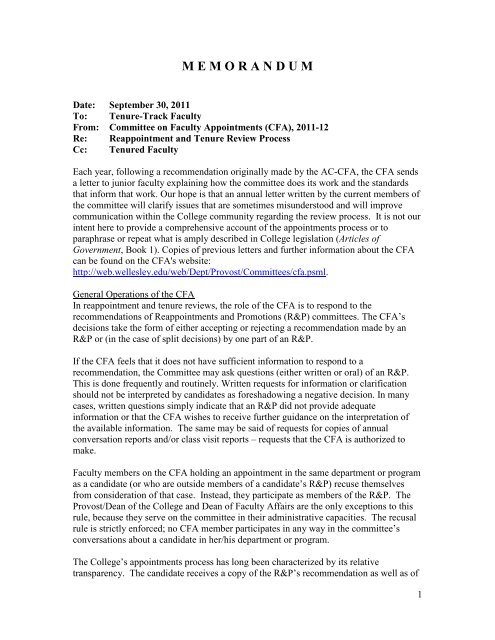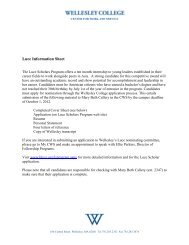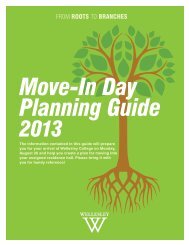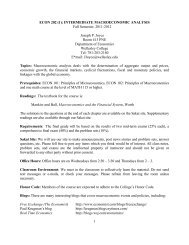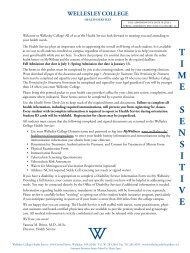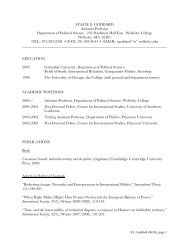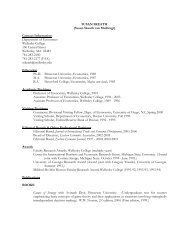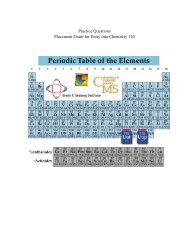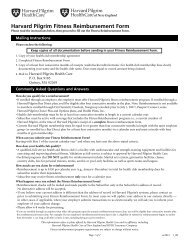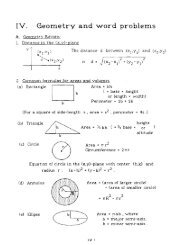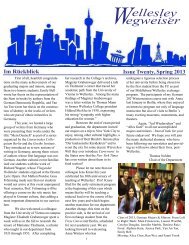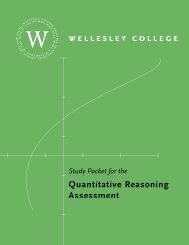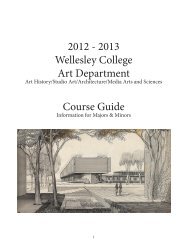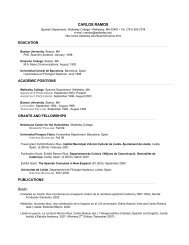Annual memo to junior faculty 11-12 - Wellesley College
Annual memo to junior faculty 11-12 - Wellesley College
Annual memo to junior faculty 11-12 - Wellesley College
Create successful ePaper yourself
Turn your PDF publications into a flip-book with our unique Google optimized e-Paper software.
M E M O R A N D U MDate: September 30, 20<strong>11</strong>To: Tenure-Track FacultyFrom: Committee on Faculty Appointments (CFA), 20<strong>11</strong>-<strong>12</strong>Re: Reappointment and Tenure Review ProcessCc: Tenured FacultyEach year, following a recommendation originally made by the AC-CFA, the CFA sendsa letter <strong>to</strong> <strong>junior</strong> <strong>faculty</strong> explaining how the committee does its work and the standardsthat inform that work. Our hope is that an annual letter written by the current members ofthe committee will clarify issues that are sometimes misunders<strong>to</strong>od and will improvecommunication within the <strong>College</strong> community regarding the review process. It is not ourintent here <strong>to</strong> provide a comprehensive account of the appointments process or <strong>to</strong>paraphrase or repeat what is amply described in <strong>College</strong> legislation (Articles ofGovernment, Book 1). Copies of previous letters and further information about the CFAcan be found on the CFA's website:http://web.wellesley.edu/web/Dept/Provost/Committees/cfa.psml.General Operations of the CFAIn reappointment and tenure reviews, the role of the CFA is <strong>to</strong> respond <strong>to</strong> therecommendations of Reappointments and Promotions (R&P) committees. The CFA’sdecisions take the form of either accepting or rejecting a recommendation made by anR&P or (in the case of split decisions) by one part of an R&P.If the CFA feels that it does not have sufficient information <strong>to</strong> respond <strong>to</strong> arecommendation, the Committee may ask questions (either written or oral) of an R&P.This is done frequently and routinely. Written requests for information or clarificationshould not be interpreted by candidates as foreshadowing a negative decision. In manycases, written questions simply indicate that an R&P did not provide adequateinformation or that the CFA wishes <strong>to</strong> receive further guidance on the interpretation ofthe available information. The same may be said of requests for copies of annualconversation reports and/or class visit reports – requests that the CFA is authorized <strong>to</strong>make.Faculty members on the CFA holding an appointment in the same department or programas a candidate (or who are outside members of a candidate’s R&P) recuse themselvesfrom consideration of that case. Instead, they participate as members of the R&P. TheProvost/Dean of the <strong>College</strong> and Dean of Faculty Affairs are the only exceptions <strong>to</strong> thisrule, because they serve on the committee in their administrative capacities. The recusalrule is strictly enforced; no CFA member participates in any way in the committee’sconversations about a candidate in her/his department or program.The <strong>College</strong>’s appointments process has long been characterized by its relativetransparency. The candidate receives a copy of the R&P’s recommendation as well as of1
any correspondence between the CFA and the R&P (with appropriate redactions). At anystage of the process, the candidate is free <strong>to</strong> communicate in writing <strong>to</strong> the CFA. TheCFA does not share such communications with R&Ps, so if a candidate wishes her/hisR&P <strong>to</strong> see a copy, she or he should provide one directly. The transparency of ourprocess is intended for the benefit of the candidate and not others; members of R&Ps andthe CFA are expected <strong>to</strong> adhere scrupulously <strong>to</strong> the principle of confidentiality.The CFA gives thorough and careful consideration <strong>to</strong> each case before reaching adecision. It has been the practice of the committee never <strong>to</strong> make a decision about areappointment or tenure decision at the first meeting at which it is discussed. Every caseis considered on at least two occasions, and frequently more than that. As a result, anextended period of time may elapse between the time at which a case is first considered(and written questions submitted <strong>to</strong> an R&P) and the time at which a decision is made.Each case that comes before the CFA is considered on its own merits. The CFA does notcompare candidates <strong>to</strong> one another. The <strong>College</strong> does not have reappointment or tenurequotas or caps. The <strong>College</strong> has long held rigorous expectations for <strong>faculty</strong> performancein each of the three main areas of activity (scholarship, teaching, and service) consideredat reappointment and tenure. In view of these high standards, negative appointmentsdecisions are likely <strong>to</strong> occur from time <strong>to</strong> time. Naturally, the past cannot necessarily betaken as a guide <strong>to</strong> future decisions, but the record of the last ten years does not show anytrend <strong>to</strong>wards an increased number of negative decisions.Standards for TeachingFrom the AC-CFA’s conversations with us, we know that the CFA’s interpretation ofStudent Evaluation Questionnaires (SEQs) is an area of particular concern. While SEQsare an important part of a candidate’s dossier, they are examined critically and readcarefully by the CFA in the context of the overall teaching portfolio, which includes thecandidate’s personal statement, the R&P’s recommendation, enrollments, syllabi andother pedagogical materials, and unsolicited letters. Rather than focusing on specificindividual comments, CFA members identify persistent or prevailing themes (positiveand negative) in the student comments and significant trends in the quantitative andqualitative data. We do not make the assumption that excellent teaching is necessarilysynonymous with high scores and lauda<strong>to</strong>ry student comments. The committeerecognizes that some attributes of excellent teaching (high standards, demanding orchallenging coursework) or some legitimate pedagogical methods (for example, coldcalling)might be characterized negatively in some student comments. The CFA placesprimary emphasis on the quality of student learning.Following the recommendation of a prior AC-CFA, in 2010-<strong>11</strong>, the <strong>College</strong> implementeda five-point rating scale for SEQs. The previous, four-point scale, offered two positiveoptions, one neutral, and one negative; an additional negative option was added <strong>to</strong>improve the symmetry of the scale. We have analyzed the results of this change and havenot found that the five-point scale has changed the overall balance of the SEQs or led <strong>to</strong>more negative ratings on the whole. We will continue, however, <strong>to</strong> watch the results <strong>to</strong> besure that <strong>junior</strong> <strong>faculty</strong> are not disadvantaged by the move <strong>to</strong> the five-point scale. We did2
notice more student errors in filling out the new scale (most frequently a student giving anegative rating <strong>to</strong> a course that she clearly meant <strong>to</strong> rate positively, an error we hadnoticed previously but one that does seem <strong>to</strong> be becoming more common). Beginning in20<strong>11</strong>-<strong>12</strong>, the numbers will not appear on the scale as it goes out <strong>to</strong> students, in order <strong>to</strong>focus their attention on the descriptive headings, with the expectation that this changemay reduce the problem of reversing a 5 for a 1. Again, we will continue <strong>to</strong> moni<strong>to</strong>r thepattern of errors on the SEQs, and we do want <strong>to</strong> reassure <strong>junior</strong> <strong>faculty</strong> that all thequalitative comments on all SEQs are carefully read by the CFA and such errors aretaken in<strong>to</strong> account and adjusted for when we evaluate each SEQ record.The CFA recognizes the importance of independent study supervision as a form ofteaching. Since there are no SEQs for independent studies, the Provost’s office gets in<strong>to</strong>uch with all students participating in 250s, 350s, and 370s at the conclusion of eachsemester, reminding them of the opportunity <strong>to</strong> write letters reflecting on their learningexperience.Junior <strong>faculty</strong> members often ask how <strong>to</strong> balance their own research needs withcollaborative work with students. The <strong>College</strong> highly values the extension of researchopportunities <strong>to</strong> students, but also emphasizes that <strong>faculty</strong> members should feelcomfortable involving students in their research projects <strong>to</strong> the extent that seemsappropriate <strong>to</strong> the specific discipline or project. We also note that an extensive record ofcollaboration with students would not exempt a <strong>faculty</strong> member from meeting the<strong>College</strong>’s high standards for research.It is the responsibility of the Provost’s office <strong>to</strong> publish a list of <strong>faculty</strong> under review eachyear. While letters from colleagues and students are welcomed, the CFA does not judgea case based on the number of unsolicited letters received, nor do we encourage <strong>faculty</strong> <strong>to</strong>solicit them.Standards for ResearchAs noted above, the <strong>College</strong> maintains high standards of scholarly research. The CFAdoes not equate these high standards with a particular number of publications or a setmeasure of productivity. In every case that it considers, the committee is concernedprimarily with the quality, originality, and significance of the contribution that a <strong>faculty</strong>member is making, has made, and will make <strong>to</strong> the scholarly or artistic field in which heor she is working. In order <strong>to</strong> evaluate scholarly work, the CFA considers all relevantevidence, including the candidate’s research statement, assessment of R&P colleagues,the professional judgment of external evalua<strong>to</strong>rs (in tenure cases), the quality ofpublication venues, the standards and definitions of excellence appropriate <strong>to</strong> a particularfield, as well as any relevant indica<strong>to</strong>rs of professional standing and distinction. Thecommittee finds that significant contributions <strong>to</strong> a scholarly field generally involve arecord of substantial publication. But the committee does not reduce its overallevaluation of a research portfolio <strong>to</strong> the counting of publications.3
Standards for ServiceService <strong>to</strong> the <strong>College</strong> forms an important part of every case for reappointment or tenure.The CFA understands that opportunities for service vary across the <strong>College</strong>, so we do notexpect all service records <strong>to</strong> look the same. Participation on committees of AcademicCouncil is one valuable form of service, especially if the committee member has been anactive contribu<strong>to</strong>r <strong>to</strong> the work of a committee. A recent survey conducted by the AgendaCommittee (in 2010-<strong>11</strong>) suggested that many <strong>faculty</strong> members, including formermembers of the CFA, do not believe that department service is given as much weight asservice on committees of Academic Council. We would like <strong>to</strong> reassure <strong>junior</strong> <strong>faculty</strong>that we do consider department service as an important and valuable part of the case for acandidate's service. As with both teaching and scholarship, the CFA seeks <strong>to</strong> evaluate theoverall quality of a candidate's service contribution. For that reason, it is important thatboth candidates and R&P committees address details of the service contribution in theirstatements <strong>to</strong> the CFA, especially as service at the department level may be harder for theCFA <strong>to</strong> recognize and evaluate. Other forms of professional service and student advisingmay be considered as part of a service record, though these activities also bear upon acandidate's scholarly activity and teaching.Members of the 20<strong>11</strong>-<strong>12</strong> Committee on Faculty Appointments:H. Kim Bot<strong>to</strong>mly, PresidentAndrew Shennan, Provost and Dean of the <strong>College</strong> (Chair)Kathryn Lynch, Dean of Faculty Affairs (non-voting)Patricia Berman, ArtDan Brabander, GeosciencesEmily Buchholtz, Biological SciencesVernon Shetley, EnglishGroup B representative, TBDClerk of the CFA: Ruth Frommer, Office of the Provost and Dean of the <strong>College</strong>4


